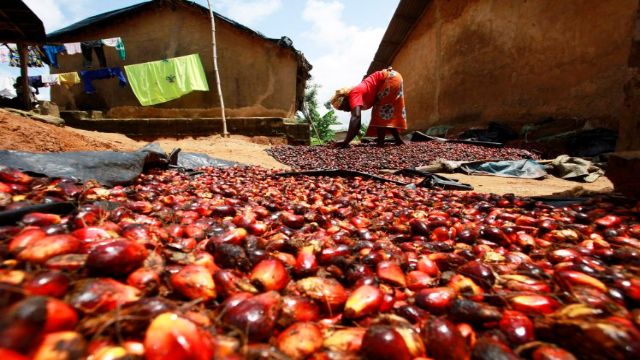
The Federal Government says it will create more than four million jobs through oil palm production in the country.
Mr Sunday Akpan, the Permanent Secretary, Federal Ministry of Industry, Trade and Investment said this in a statement signed by Mr Sorinolu Olayinka, Senior Information Officer in the ministry in Abuja.
Akpan, who was represented by the Director, Department of Commodity Produce and Inspectorate (CPI), Mrs Omololu Ope-Ewe, said this during the presentation of the draft Oil Palm Policy document value chain.
He said that Federal Government was working toward ensuring the repositioning of the Oil Palm sector for optimal contribution in terms of job creation and revenue sources for both government and the private sector.
Akpan said that oil palm which once played a predominant role in the Gross Domestic Product (GDP) of the country, depended on imported ones to augment local production.
He said the local production was just about one per cent GDP, unlike the contribution of 70 per cent GDP in the past.
Akpan said that potentiality in the sector with the propensity to sufficiently and conveniently to place the country as a major oil palm producer and exporter, “as against what is obtainable in the crude oil sector”.
“The essence of the national oil palm policy is to guide, regulate, protect and support both public and private investment in the sector,” he said.
He charged stakeholders to put aside personal and organisational interest and consider the draft policy document bearing in mind the impact it would create on the economy.
Akpan said that with the policy in place, the country would have a national document that would protect the sector, while due diligence would be done to stimulate investment for higher productivity.
He assured all stakeholders of government’s support for a robust oil palm industry that would be of immense benefit for all, which upon completion, the document would be forwarded to the Federal Executive Council (FEC) for approval.
Earlier, in her presentation of the draft policy document, Mrs Funmi Ilamah of the Management Strategy Advisory Ltd. said that the policy document was very important to the producers of the crude palm oil.
Ilamah said that the policy remained a fundamental step toward strengthening and supporting the development of agriculture in Nigeria as presently introduced by the current administration and the private sector.
She said that the final National Policy Document on Palm Oil value chain in Nigeria would allow producers to complete globally in the international market.
According to her, the policy will increase the sources of revenue to government at state and federal levels and boost job creation in the country.



